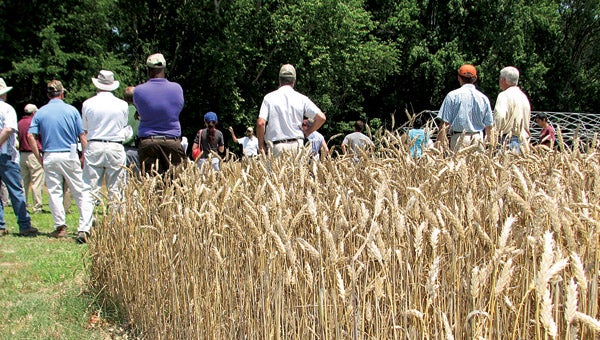Dry times
Published 10:27 pm Thursday, June 2, 2011

Field day: The Virginia Tech Tidewater Agricultural Research and Extension Center hosted a field crops day Thursday to show farmers and others about this year’s developments in research.
Farmers worry about drought
A group of about 50 men and women traipsed through dusty fields along Hare Road on Thursday.
They were there for the Virginia Tech Tidewater Agricultural Research and Extension Center’s field crops day. Throughout the morning, they learned about diseases threatening crops this year, ongoing research by Virginia Tech scientists and the newest alternative fertilizers.
But the farmers, researchers, Extension agents and others spent much of the day worrying about the blazing heat, the blowing dust and the grass crunching underneath their feet.
“We don’t think of this time of year as being a particularly drought-prone time of year,” said Allen Harper, the Suffolk extension director and state swine Extension specialist. “This is kind of unusual this early in the year.”
The early dry conditions are particularly troublesome after last year’s drought caused massive crop losses. Drought conditions also contribute to a proliferation of insects that attack crops, which was another topic of Thursday’s field tour.
“If this stays dry, we’re looking at potentially another tough insect year for these crops,” Ames Herbert, the entomologist at the Suffolk Extension center, told the gathering.
Of particular concern this year are thrips, sap-sucking insects that can destroy crops already weakened by drought, and corn earworm moths.
Thrips already are attacking fruit crops in West Virginia and the western part of Virginia, Herbert said.
“That’s one that we’re going to be watching pretty closely,” Herbert said.
As for corn earworm moths, “they’re already showing some evidence of resistance to the most commonly-used pesticides,” he said.
Together, the pests attack nearly every crop grown in southeastern Virginia. Dry conditions also mean the plants cannot tolerate as much damage from insects as they could otherwise.
“We need that good, natural rainfall,” Harper said, noting that many farmers do not have the resources necessary to irrigate their fields.
When the attendees at the tour weren’t watching the sky or furrowing their brows at the ground, they were learning about different products that will be needed this year after several highly effective fertilizers and pesticides have been tightly regulated or outlawed by federal agencies.
They also viewed an experiment that tests the effects of drought on different varieties of wheat, in an effort to produce species that fare better in drought conditions. The experiment features several short rows of wheat under a clear shelter next to more rows that are not protected by a shelter.
“I like to see the on-farm trials,” said Randy Everett, a farmer in the Dinwiddie and Sussex county areas who grows cotton, tobacco, soybeans, corn and wheat. “Hands-on information is good. There’s no substitute for seeing things in the field in real-time.”
Harper said the Tidewater Extension center tries to have several field crop days each year, so farmers can see what works best in the field, and for researchers and chemical company representatives to view the fruits of their labor.





